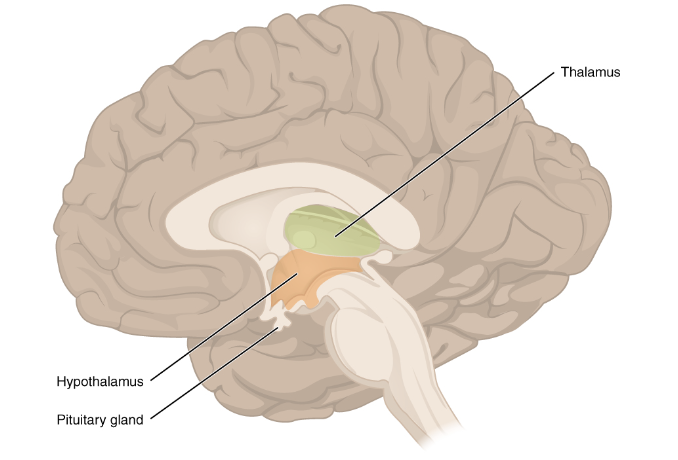What are the functions of the hypothalamus, pituitary gland, and thalamus in the brain?

Understand the Problem
The question seems to involve identifying and understanding the functions of the different parts of the brain shown in the image, specifically the hypothalamus, pituitary gland, and thalamus.
Answer
The hypothalamus manages vital bodily functions, the pituitary gland produces critical hormones, and the thalamus processes sensory information and regulates consciousness.
The hypothalamus regulates the endocrine system and manages body temperature, hunger, thirst, mood, sex drive, blood pressure, and sleep. The pituitary gland produces hormones that control various bodily functions and other glands. The thalamus plays a role in processing sensory information and regulating sleep, wakefulness, consciousness, learning, and memory.
Answer for screen readers
The hypothalamus regulates the endocrine system and manages body temperature, hunger, thirst, mood, sex drive, blood pressure, and sleep. The pituitary gland produces hormones that control various bodily functions and other glands. The thalamus plays a role in processing sensory information and regulating sleep, wakefulness, consciousness, learning, and memory.
More Information
The thalamus is often considered the brain's relay station, as it processes and transmits sensory information to the appropriate areas of the brain. The hypothalamus and the pituitary gland are critical components of the endocrine system, crucial for maintaining homeostasis.
Sources
- Physiology, Hypothalamus - StatPearls - NCBI Bookshelf - ncbi.nlm.nih.gov
- Functional Anatomy of the Hypothalamus and Pituitary - NCBI - ncbi.nlm.nih.gov
- Thalamus: What It Is, Function & Disorders - Cleveland Clinic - my.clevelandclinic.org
AI-generated content may contain errors. Please verify critical information